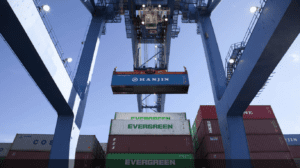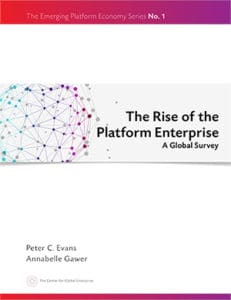There has been a lot of discussion about whether the Uber model can transform the freight industry. But the technology startups focused on international shipments – ocean or air – are quicker to embrace comparisons to other large tech platforms like Priceline, Orbitz, or Expedia.

Max Lock, the CEO of Fleet Logistics, said we don’t offer an Uber style marketplace, because Uber transactions occur quickly and show up very quickly.” Fleet offers an online marketplace connecting shippers to freight forwarders, both ocean and air. “The complexities of international shipping make that impossible.” On the Fleet site, when a customer asks for quote, the first 5 freight forwarders who respond are presented to the prospect. This may take some period of time. The customer then chooses a forwarder to work with, partially by looking at the freight forwarder ratings and price. So rather than an Uber model, this is a rating and review platform more akin to TripAdvisor.
The CEO of Freightos, Zvi Schreiber, another marketplace connecting freight forwarders in air and ocean to shippers, agrees that a better analogy would be to Priceline, Orbitz, or Expedia. “Uber is a sharing economy marketplace. They entice new drivers to enter the market. We are not enticing new freight forwarders to enter the market.”
Dr. Schreiber also agrees that in contrast with Uber, where a passenger can get an almost instant notification that a driver can pick them up within a few minutes, that is not currently possible for international freight. Freightos does provide quotes within 20 seconds to shippers, but these are not binding quotes until the freight forwarder can determine that they can capture a slot on the ship or plane. The freight forwarder has one day to cancel the order. However, “over 90 percent of the time the quote is honored.” And in the case of air, where a 3 or 4 day transit time is quoted, if the forwarder can’t get a slot on one carrier’s plane, they usually can on a different carrier. At Freightos, roughly half of the 50,000 quotes they provide in a quarter are for air.
It is often assumed that new technology-based marketplaces generate value by disintermediating inefficient middlemen. That is clearly not the case at Fleet or Freightos, where they are looking for freight forwarders – the intermediaries linking carriers to shippers – to be core to providing shipping services.
This is also true of CoLoadX, a startup focused on connecting ocean freight forwarders to shippers. One of the founders, Petere Miner, used to be the Director of Global Logistics Procurement at Hewlett-Packard. “Freight forwarders are necessary because shippers need service. The mistake many startups have made is looking at a freight forwarder like they are a travel agent. They aren’t. They add value. Shippers don’t want to negotiate customs in Indonesia or a trucking delivery in Ukraine. Freight forwarders can’t be disintermediated!”
Mr. Lock of Fleet provided a different example of how freight forwarders provide value. “The largest air freight forwarders actively work to consolidate less-than-container loads (LCLs) to full-container loads (FCLs). They do the consolidation themselves.” These consolidation services save shippers money. “In ocean, some of the biggest freight forwarders physically do this as well, but often they have VanGuard or ShipCo do the consolidation for them.”
Other startups, don’t look to provide more efficient connections between shippers and freight forwarders. They are freight forwarders! Caitlin Meaden, the Director of Marketing at Cargo Chief, also describes Cargo Chief as being a freight brokerage, but a technology first broker. “We are a traditional broker, but we’ve made the decision to create sophisticated Silicon Valley technology (we are actually headquartered down the street from Google’s headquarters) to solve these problems.”
Flexport is another example of a startup that is a freight forwarder. Ryan Petersen, the CEO at Flexport, rejects the Uber analogy for a different reason. “When it comes to international shipments, this can’t be a completely automated process in the same way Uber is.” Freight forwarders accept that this is a service business and staff up accordingly. According to Ryan Petersen, the CEO at Flexport, “if there are exceptions, and freight forwarding is full of exceptions, those issues are generally handled by phone. This needs to be a high touch business in that sense.”
There are three revenue models associated with the startups looking to reinvent the freight industry. One model is where the forwarders buy the solution in a Software as a Service (SaaS) model, which has historically been the Freightos model.
The second model is based on transaction fees. Companies like Fleet and CoLoadX are focused on the transaction model, and this is what Freightos is beginning to shift to. The transaction fees can be charged to buyers, or sellers, or both. Dr. Schreiber made the point that most marketplaces, whether consumer or industrial, charge the sellers and that is what Freightos does as well.
The final model is a brokerage model. A broker is an intermediary that connects buyers and sellers. They make money based on the difference between what they buy a product or service from a seller for, and what they sell it to a buyer for. In short, the amount of money they make is based on their margin. A freight forwarder is a broker that specializes in international shipping.
Startups based on the transaction model argue that the transaction model can be viewed as a more disinterested approach. Renee DiResta, one of the founders of Haven Inc., pointed out that in the transaction model “a shipper does not have to worry that a poor partner is being foisted on them.” With brokers, there can always be the suspicion that the broker is connecting the shipper to the carrier with whom they can make the most money. Haven is a startup focused on ocean freight.
iContainers provides another example of a freight forwarder style tech startup. The CEO of iContainers, Jaimie Jiminez, points out that the brokerage model trust can be addressed with rating functionality. Just as on TripAdviser, Airbnb, or Uber, where buyers can rate their providers, shippers can rate their business partners on the iContainer site as well.
But most of the tech startups with a transaction model also provide rating functionality. In ocean, the transit time a forwarder quotes to shippers can often be highly unrealistic. Forwarders providing unrealistic times get dinged on their ratings. Dr. Schrieber of Freigtos says they are coaching their forwarder participants to provide more realistic times. “Too often they are just quoting the sailing schedule.” They need to factor in the time it takes to get the goods to port, the fact that the sailing departure on a particular line may only occur once a week, customs delays, and other similar leg transit times. “Forwarders would be far better off quoting something like 30 to 40 days” then providing inaccurate service commitments.
Ms. Meaden from Cargo Chief believes that in addition to ratings, inaccurate transit times should also be addressed through the use of predictive analytics. “We collect data from load boards, shippers, carriers or sources like Amazon or weather (feeds). By combining this data with machine learning, we’ve been able to identify patterns and problems (that are) surfacing.”
Furthermore, as Mr. Lock pointed out, it is not just important for shippers to be able to rate freight forwarders, it is important for freight forwarders to be able to rate shippers. Fleet is building out their shipper rating functionality and doing “more to insure the financial integrity of shippers in the network.” In a marketplace, all parties to a transaction need to be assured they are working with reputable partners.
So will these startups transform international shipping? In part that depends upon how fast they scale, which is no easy task. But it also depends on how two very well established existing Ocean marketplaces – INTRRA and GT Nexus – respond to the startups.
ARC has recently published a global market study on Transportation Execution Marketplaces & Solutions which provides quantitative data on this market.

















